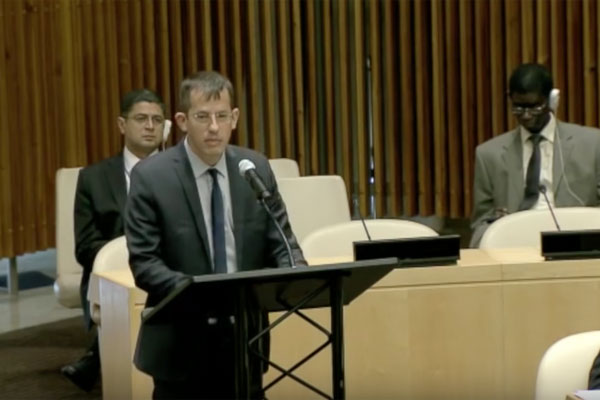Senior Likud official, angry that Hagai El-Ad demanded the UN act to end the occupation, admits there’s no legal avenue to strip his citizenship — at the moment. The Israeli human rights organization says threats won’t deter it.

How does the only democracy in the Middle East deal with outspoken human rights activists? By threatening to revoke their citizenship, of course.
“I examined whether, legally speaking, if I can ask the interior minister to revoke the citizenship of B’Tselem’s executive director,” declared the Israeli parliament’s coalition chair, David Bitan, who serves as the whip for Benjamin Netanyahu’s ruling Likud party.
“I checked, and there’s no legal avenue for doing so today,” Bitan told Israeli television’s Channel 2 on Friday (Hebrew). “But we must strip his citizenship.”
B’Tselem Executive-Director Hagai El-Ad was invited to address a United Nations Security Council special session on Israel’s illegal settlements last week, along with a representative of Americans for Peace Now.
In his speech, published here in full, El-Ad said that international complacency has been a major factor in enabling Israel to maintain its military occupation over millions of Palestinians for nearly 50 years.
“The rights of Palestinians must be realized,” El-Ad’s declared in his Security Council speech, imploring the international body: “The occupation must end; the UN Security Council must act; and the time is now.”
In his call to revoke El-Ad’s citizenship, Coalition Chairman Bitan decried, “an Israeli citizen […] going to the Security Council and demanding sanctions on Israel and Israel’s citizens.”
B’Tselem and its director have been the targets of vicious incitement campaigns in recent years, the most notorious of which labeled El-Ad and others as foreign agents somehow tied to Palestinian stabbing attacks. Another declared that Israeli human rights organizations are serving anti-Semitic European paymasters to the detriment of their own country.
Israeli Prime Minister Benjamin Netanyahu himself joined the attacks against B’Tselem following El-Ad’s UN speech, saying the organization and its director are part of “a chorus of slander” against Israel.
The prime minister’s attack on Israel’s most prominent human rights organization earned him a rebuke from the United States government, which came out in defense of B’Tselem and other human rights groups.
B’Tselem published the following in response to Bitan’s statement on Friday:
For almost 50 years Palestinians have not had citizenship or rights. Now, the coalition chairman, the prime minister’s representative, wants to revoke the citizenship of anyone who speaks out against that reality. Such threats will not deter B’Tselem or the hundreds of thousands of Israelis who oppose the occupation.
“Bitan is just trying to accrue a little more political capital at the expense of B’Tselem, an organization which for years has been doing its utmost to ensure and protect human rights in our stricken region,” responded Zehava Galon, head of the left-wing Meretz party. “But those types of calls are dangerous and invite violence.”
As I wrote earlier this year when the Israeli government passed a law that singles out human rights organizations for their foreign funding, the cumulative effect of the establishment going after human rights groups is to portray those working to end the occupation, fighting for equality and liberal democratic values as dissidents subverting the State of Israel itself:
In the absence of any hope for resolving the conflict, with increasingly frequent and predictable outbursts of violence, and as the future of the region becomes frighteningly unstable, Israelis have turned inward to a different type of hardline politics. In the worldview of Israel’s current political ethos, Zionism has mutated into a zero-sum ideology of Jewish supremacy in which dissent must be met with an iron fist, and opposing the occupation (which much of the perceives as caring more about Palestinians than Jews) is akin to something short of treason. With no alternatives to offer, the country’s political elite has led the charge.

